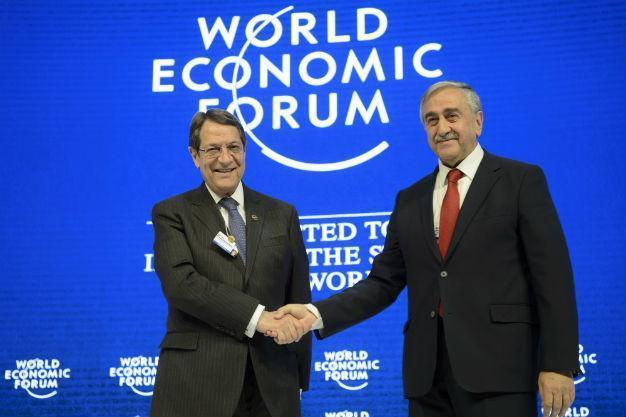Cyprus leaders at Davos say peace deal possible in 2016
DAVOS

President of Cyprus Nicos Anastasiades, left, shakes hands with Turkish Cypriot Leader Mustafa Akinci, right, during a panel session at the 46th Annual Meeting of the World Economic Forum, WEF, in Davos, Switzerland, Thursday, Jan. 21, 2016. AP photo
The two leaders of divided Cyprus said on Jan. 21 that a deal was possible this year to end decades of conflict over the island, calling on the international community to support peace efforts during their joint address to business leaders in Davos.“I believe 2016 could be the year that we end the unacceptable status quo,” Greek Cypriot President Nicos Anastasiades was quoted as saying before an audience at the World Economic Forum according to AFP.
Turkish Cypriot leader Mustafa Akıncı told delegates that the pair would “continue our hard work to put an end to the ... problem and pave the way for new economic opportunities.”
Akıncı’s invitation to Davos has a special significance for the Turkish Cypriots, as it marks the first time a president of Northern Cyprus has been invited to and addressed the international summit, attended by leaders, top businesspeople and politicians from around the world.
The leaders were due to meet U.N. Secretary General Ban Ki-moon in Davos later in the day.
Cyprus has been divided since 1974, when Turkish troops occupied its northern third in response to an Athens-inspired coup seeking union with Greece.
Long-stalled U.N.-brokered peace talks, which many observers see as the best chance to reunify Cyprus after four decades of division, were relaunched last May.
Hopes for a peaceful solution to the 40-years-long dispute have ramped up after Akıncı was elected in April 2015 as the leader of the Turkish Cypriots.
Leaders request funding for peace efforts
Meanwhile, both Anastasiades and Akıncı called on the international community to fund peace efforts, as any agreement is likely to prove costly because property disputes may require substantial payouts.
“We hope we have the support of the international community at large, particularly with regard to substantially contributing to the financial aspects of the solution,” Anastasiades said.
“Living in the middle of a region in turmoil, we are committed to continue working with resolve to heal an open wound at the heart of Europe,” he added.
U.N. Secretary General Ban Ki-moon said earlier this month that he believes a Cyprus settlement “is within reach.”
But several thorny disputes, including territorial adjustments, power sharing and property rights will need to be resolved if a unified, federal Cyprus is to occur.
Both leaders know that without tough compromises on property and territory a solution will be hard to sell to their respective communities. And any accord must be ratified by Cypriots at the ballot box, with some reports suggesting that the U.N. is aiming for a referendum as soon as March.
The last referendum in 2004 saw a majority of Turkish Cypriots back reunification, only for more than three quarters of Greek Cypriots to vote against the idea. The Greek Cypriots later in the year joined the European Union. Turkish Cypriots are considered EU citizens, even though they live on territory not under the control of the Greek Cypriot government.
















